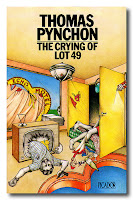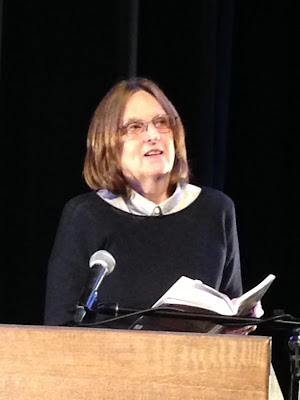Another book (suggested by Ann) which tended to prompt discussion of the history on which it centres - in this case the Spanish Civil War - rather than of its treatment of those issues or the book as a literary artefact. However, the unusual structure of this book is of great interest both politically and aesthetically.
It is constructed in three parts, the central one taking a different form and voice from those of the two sandwiching it. In the first part, titled 'Forest Friends', the first-person present-day narrator, who has the same name as the author, disarmingly and wittily recounts his own failures as both a fiction writer and husband, and relates how, in an attempt to resurrect his earlier career as a journalist, he ended up interviewing a writer and lecturer who happened to be the son of the deceased fascist and writer Rafael Sanchez Mazas, a founder of the original Falangist movement that first whipped up agitation against the Spanish Republican government in the 1930s. During the interview, Cercas relates, the son mentioned the fact that in January 1938, as the Republican troops were advancing near the French border, his father faced a firing squad at Collell but escaped the bullets and fled into the woods, hounded by Republican militiamen. As he cowered in a gulley, a Republican militiaman came upon him, but called to the others that there was no one there, and turned away, thus saving his life. Subsequently Mazas was given succour by a group of deserted Republicans, 'the forest friends'.
Cercas relates how, intrigued by this, he became curious about Sanchez Mazas and about the Civil War and its 'horrific stories' which 'till then I'd considered excuses for old men's nostalgia and fuel for the imagination of unimaginative novelists' - the pain of the Spanish Civil War, as Ann said, having since been largely buried in Spanish public consciousness. Cercas then relates how he followed up a series of connections and contacts resulting from a newspaper article in which he had recounted the incident of the firing squad, ending up speaking to some of those involved, including a son of one of the 'forest friends'. He came, he says, to understand that the story of the firing squad was well known after the war, when the louche, aristocratic Mazas lived off it as a famous personality and (inactive) politician. The question that then came to obsess Cercas was whether or not the story was true, and he reached a point where he knew he had to write a book about it, not a novel, but a 'true tale, a tale cut from the cloth of reality, concocted out of true events and characters'.
Part Two is different in mode. The confessional mode is dropped, and the section, titled 'Soldiers of Salamis' - a reference to the outnumbered Greeks who routed the invading Persian fleet in 480 BC, and the title of the book that Sanchez Mazas had told the 'forest friends' he would write about his time with them, but didn't - takes the conventional academic mode of a history. Beginning with an incident after the war that was related to Cercas by a son of one of the forest friends, in which Mazas intercedes on behalf of his imprisoned former forest companions, and hinging on the whole firing-squad and forest-friends episode, it is an account of the life and career of Sanchez Mazas, an anatomisation of the muddled politics and loyalties of the Spanish Civil War and its aftermath, and a meditation on the involvement with a violent movement of a cowardly and aesthetically conservative mind.
Part Three reverts to the mode of Part One. Here Cercas relates wryly how he wrote his book about Sanchez Mazas in a heat of inspiration, and then realised it was rubbish: it was missing something important he couldn't identify. (By now we have realised that Part Two is indeed the book in question.) Despairing, Cercas returns to his newspaper once more. Once again, a chance interview he is conducting, this time with the famous and exiled Chilean writer, Roberto Bolano, leads to an unexpected link with Sanchez Mazas and the firing squad incident: it becomes clear that an old friend of Bolano's could have been one of the Republican soldiers who took part in the firing squad, a man called Miralles who, unlike the effete Mazas who evaded military action in the war he helped to agitate, spent the entire war fighting on one front or another. A link with something Cercas was told earlier about the soldier who saved Mazas's life makes him think, and hope, that this is the very man - and that this is the element that is missing from his book - and he sets out to find him in his retirement home. But the old man won't admit that he is the same man, and the whole book must thus end on uncertainty. Yet Cercas is happy: now the otherwise forgotten Miralles, a true 'soldier of Salamis', and his companions, will 'still be alive in some way'.
Introducing the book, Ann said that she had enjoyed the first part, but when she got to the second part, with its dry historical account and lists of names unknown to us English readers, she nearly gave up. However, she was very glad she hadn't, as the final section of the book, which was very moving, redeemed it. Most people nodded agreement, and people commented on the contrast: the lightness of touch of much of the first and last sections, and the wryly-portrayed relationship between Cercas and his down-to-earth TV fortune-teller girlfriend who must listen to his writerly woes. (' "Shit!" said Conchi. "Didn't I tell you not to write about a fascist? Those people fuck up everything they touch!" ') Ann, a historian, was very impressed by the book's central message: that history is always just a construct built on hearsay and myth and opinion, that the truth is always muddled, or indeed unattainable. I strongly agreed, since this is my own main obsession as a writer, and felt that the structure of the book makes an important literary point about the contingency of storytelling - of which, as Ann said, history is just one form, often, as in this case, a desiccated form. Also impressive is its questioning of what makes a hero - Sanchez Mazas makes a surviving hero of himself after the war by telling the firing-squad story, but is the hero really the man who let him live, and the ordinary man who has to fight in the war? Are those whom history holds up as heroes the real heroes? It's impossible, though, to know why the soldier let Mazas live, and as Cercas and Bolano discuss, is a hero someone who makes a conscious choice in acting bravely, or someone who does so by instinct? In recording the known facts of history you can't in fact impute motives, and thus can only ever tell a partial story.
The book has been a major success in Spain, and, Ann said, it must of course have had far more resonance for those familiar with the names of political figures and historical events. (In fact, so divorced were we as a group from Spanish history and Spanish-language culture, that several people had not heard of Bolano, and for them Cercas's meeting with Bolano inevitably had less resonance than for those who had heard of or read him). Ann made the point that the book is of course striking, as Conchi's speech indicates, in focussing on a fascist at a time when Spain's fascist history has been largely buried. It is also remarkable for its depiction of the political ambiguities of the war, and it was noted that one reviewer commented that it made Hemingway's For Whom the Bell Tolls 'look like play-acting'.
The discussion was then opened out to the room, and Doug and Trevor immediately began an argument about the facts of the Spanish Civil War, to which the rest of us had to object in order to bring focus back to the book. Doug challenged me on my statement that the structure of the book, its switching of modes, made an important and resonant literary point. Although he could see what I meant, he said that surely Cercas could have made the historical section more entertaining, and that, although he absolutely agreed about the bits with Conchi, which he really enjoyed, and that the end of the book concerning Miralles was very moving, in the middle section he was frankly bored shitless. Jenny said that it wasn't just the middle section she found difficult and boring - there was the long section in Part One when Cercas is contacting all those people in order to try and find out the truth about Sanchez Mazas - all those similar-sounding unfamiliar Spanish names; she kept getting muddled between them all - and that section in Part Three when Bolano recounts to Cercas at great length Miralles' experience of the campaigns of the war. People generally agreed, and someone said that their impression while reading Part Two was that the story they had already read about (the firing-squad story) was merely being repeated in a more boring way. (In fact, we encounter the telling of the story several times, as in Part One we read in full the article in which Cercas repeats it, and Cercas ponders the variations in the different subsequent tellings he hears from others.) John, having read the book on a Kindle, made the interesting point that he might have had a better experience of it if he had read a print copy: he would then have had a better overview of its structure and would have known better where things might be leading as he read. People also commented on the difficulty of the very long sentences in the non-dramatised sections (contrasting strongly with the prose and dialogue of the more personal dramatised sections). There was also the fact that the book is not divided into chapters. I feel that this is a pretty normal convention for a book divided into parts, but most people found it unusual and that, along with a general lack of paragraphing, it made the book a difficult read. There was speculation - taking into account Don Quixote and the enormous length of Bolano's books pointed to by John - that lengthiness may be a general characteristic of Spanish-language writing. We all agreed, however, that the language of this book (which is not long) was nevertheless beautifully wry and incisive, and the contemporary dialogue in the personal sections very telling of character and mood, and we were not surprised that the translator, Anne McLean, had won a prize for the translation.
After which, the talk veered unstoppably back onto the issues, and on to the connected but general subject of false memory, and on from that to child abuse, and on...
Our archive discussions can be found here and a list of the books we have discussed, with links to the discussions, here









































